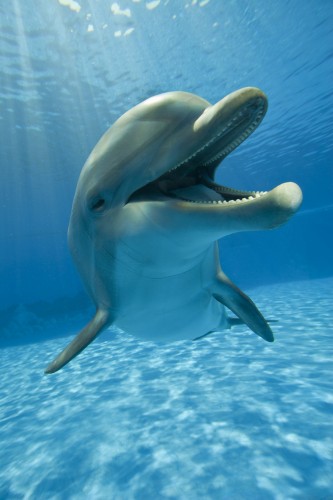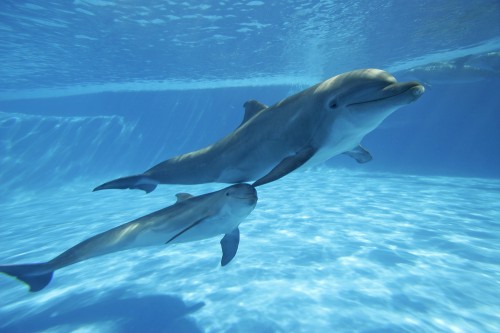There is a hyper-intelligent mammal in the oceans with whom we might communicate if only we were a more empathetic and patient species. This is the unspoken assumption behind most coverage I see of dolphins. But since 2013, when I read the book reviewed below, I view those ideas in a completely different light. One wonders what other animal could accidentally have been made the subject of that fiction.
When John Lilly first suggested dolphins were super-intelligent, the context was clearer. The neurophysiologist was injecting his dolphins with LSD, masturbating them to encourage cooperation and hanging out with Timothy Leary. Before understanding that dolphins were conscious breathers, Lilly accidentally asphyxiated his subjects by fully anaesthetizing them for brain studies, but as they died they made a lot of strange sounds. He slowed down the recordings and – woah, man – the dolphins were totally trying to talk human.
Dolphin researchers at the time joked that – far from the living, breathing marine mammals they worked with – Lilly had conjured a sort of floating hobbit, peacefully civilizing the ocean Shire. The thing is, my generation never even held these notions up to the scrutiny of the adult mind. Extraordinary assertions, after all, require extraordinary evidence. In Are Dolphins Really Smart?, Justin Gregg patiently hauls away the entrenched myth for an honest assessment of what science is, and isn’t, telling us. The book is set to hit the Christmas-shopping shelves, but here’s a sneak peek of his important findings.
One by one, Gregg takes on the prevailing ideas about dolphins: that they are unusually self-aware, that they are the second-most intelligent animal after humans, that they have a language, that they are uniquely friendly and live in playful harmony. In each case he shows that dolphins are not, strictly speaking, exceptional.
They have a suite of abilities that are also found in primates and corvids, having evolved independently in somewhat similar social structures. Many other species since have been found to rank above dolphins in each of these qualities, but even this idea of ranking them on a linear scale – especially for intelligence – turns out to be an exercise in assessing how human-like another species is. More a philosophical task than a scientific one.
A disproportionate amount of dolphin research time has been devoted to teasing out any potential for language – the science-fictional myth of dolphinese – from their vocalizations. If dolphins had language, we would almost certainly have found it by now. When their vocalizations turned out to be rote and inflexible, “I’m scared!” “I’m mating!” “I see food!” pretty much covers it, the research turned to echolocation clicks. Perhaps dolphins were sending each other 3D holographic messages encoded in their clicks. Nope.
They do have signature whistles that identify the dolphin as an individual, but that’s the most referential thing about their communication system. In contrast, ground squirrels have an amazingly semantically-rich signaling system. Nothing about the dolphin whistle repertoire would prevent it from being used as a discrete combinatorial system to convey unlimited meaning, it’s just that dolphins don’t use it for that. “Scientists have no impetus for continuing this line of research,” concludes Gregg.
Though captive dolphins have been taught to understand series of symbols, in much the same way Great Apes and parrots have, they show no sign of being able to produce them, in the way that chimps can. Dolphins are more like domestic dogs in this way, but without the vast memory for symbol repertoires displayed by Collies.
 Injured surfers abound who have been shepherded to safety by dolphins, and there are many examples of nurturing and altruism, but according to Gregg, the animal devotes a fair proportion of its time to hostility. Adult male dolphins routinely kill porpoises, not for food — or even out of competition for food – but because the porpoise is similar in size to a dolphin calf. The killings serve as practice for their regular infanticidal behaviour, a sure way to ready mothers for mating. “To truly understand dolphins, one must be open to the idea that they can be jerks,” writes Gregg.
Injured surfers abound who have been shepherded to safety by dolphins, and there are many examples of nurturing and altruism, but according to Gregg, the animal devotes a fair proportion of its time to hostility. Adult male dolphins routinely kill porpoises, not for food — or even out of competition for food – but because the porpoise is similar in size to a dolphin calf. The killings serve as practice for their regular infanticidal behaviour, a sure way to ready mothers for mating. “To truly understand dolphins, one must be open to the idea that they can be jerks,” writes Gregg.
Dolphin brains are large for their body size, but as they grow they don’t maintain their neuronal density in the way that primate brains do. It is just not the case that dolphins outclass other animals in complex cognition, and in some cases they are bested by pigeons. Problem solving, for example, is not a particular strength of dolphins.
They don’t seem to have a particularly sophisticated theory of mind (humans develop this around age four) and have never passed a test that would require them to understand that someone else does not know what the dolphin knows. They can’t follow hidden objects in a kind of slow-motion ball-and-cup trick, unlike orangutans. They show no evidence of episodic memory (humans develop this around age three), unlike scrub jays.
 Dolphins pass the much-touted Mirror Self-Recognition test, where researchers paint a dot on the animal and see whether they touch that part of their bodies when looking at a mirror. But this has been passed by many other species – and failed by some very sophisticated ones. Even in humans, the test isn’t reliable enough to show “self-awareness” across cultures. Kids as old as six in Kenya, Fiji and Peru tend to freeze in shock when confronted by their painted face in a mirror. The fact that they don’t approach and inspect it has no bearing on their status as fully-conscious beings.
Dolphins pass the much-touted Mirror Self-Recognition test, where researchers paint a dot on the animal and see whether they touch that part of their bodies when looking at a mirror. But this has been passed by many other species – and failed by some very sophisticated ones. Even in humans, the test isn’t reliable enough to show “self-awareness” across cultures. Kids as old as six in Kenya, Fiji and Peru tend to freeze in shock when confronted by their painted face in a mirror. The fact that they don’t approach and inspect it has no bearing on their status as fully-conscious beings.
PETA’s lawsuit against SeaWorld challenges dolphin captivity under anti-slavery legislation, citing exceptional intelligence as evidence of their “non-human personhood.” When advocacy for the ethical treatment of animals is based on exaggerated claims of their intelligence, it fails to recognize the inherent worth of animals regardless of their similarity to humans. And in dolphins, that similarity is easily refuted. It’s time relieve the dolphins of all our human baggage and realize that evolution has produced all kinds of intelligence, and it’s all around us.
Images: Shutterstock

Thank you! Very valuable when you are steeped in those myths, and started to recognize them for what they are.
Scientifically justifiable or not, it’s hard to retain your humanity when you’re spending that time trying to argue its patent superiority and uniqueness over other living creatures.
Fweekkit preepheekkee kikkikkikkit feereelikik feepit feek dolphins feeleerreek kikikit kitik
kik kik kit.
-Pindar.
Since when does PETA base anything they do on fact, dolphins are cute and everyone thinks they are smart so why not base a high profile protest based on fraudulent claims no ones is doing to double check.
A fully-conscious status for six year olds?
Do people mature that early in Kenya, Fiji or Peru? I wasn’t aware.
Sure glad I’m not Informania’s kid!!
Yeah, back when the “genius dolphins” stuff started coming up, we also had a book about a seagull that achieved Higher Consciousness and ascended to the next evolutionary plane of life (Jonathan Livingstone Seagull, anybody else remember that?). Kind of shows you the mindset of the time. Of course, things are even crazier now in some ways.
BTW, I joined the other PETA – People for the Eating of Tasty Animals. 😉
The fact that so many of us bought into these dolphin myths, based on what the media told us at the time, makes me feel about as naive and duped as when I discovered there was no Santa, Easter Bunny, or Tooth Fairy AFTER all.
I’ve seen enough, decades later, to have learned that the science midgets in our press STILL prefer to believe and spread the Gene Roddenberry Theory of How the Universe Works. And they’ll glom onto any researcher who allows them to perpetuate their affection for sci-fi over science.
Dolphins: The grinning jerkfaces of the sea.